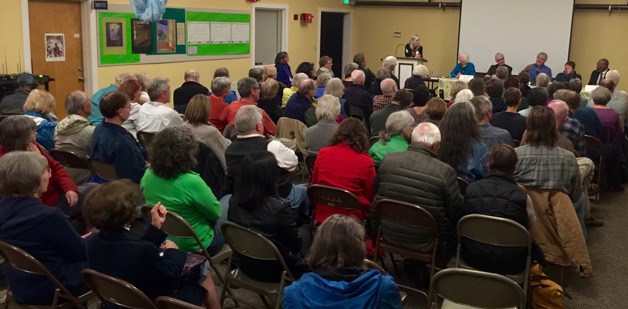Following Pope Francis’ 192-page encyclical on the environment, released in June, Bainbridge’s own spiritual authorities weighed in with a call to action.
Eagle Harbor Congregational Church drew a packed house — 60 listeners-plus — for the Faith and Climate Change Forum held last week, where leaders from five different congregations (the host church, Congregation Kol Shalom, Bethany Lutheran Church, Grace Episcopal Church and Bainbridge Baha’is) gathered to discuss their faith’s perspectives on climate change as well as individual climate action.
Moderator Erika Shriner’s opening question, about whether we have a moral imperative to care for the earth, elicited responses loaded with interesting references from various religious texts.
But what was most striking was the congruity expressed by the participants: Over and over again, they affirmed that people of faith should be at the front line of the debate — reducing and reusing, picketing and praying and debunking bad theology.
“We, in the liberal faith traditions, have a role to play in helping people unmask the way theological convictions can mask or provide cover or camouflage for prejudice and apathy and laziness,” explained Eagle Harbor’s own Rev. Dee Eisenhauer.
Changing the conversation
Her appeal for accountability was echoed by many others during the 100-minute meeting.
Rabbi Paul Strasko spoke of the need to “radically convert people to the ideas of radical interconnectivity,” calling upon religious folks to treat others as subjects, rather than objects, and preach good stewardship.
“We hear these comments that you’re just picking and choosing the verses that you like,” Rabbi Strasko said.
“Yeah, that’s exactly what I’m doing. Because for every verse out there that talks about stewardship, there’s another verse out there that talks about dominion. And I’m going to choose to talk about stewardship and go ahead and say that dominion was for a different culture in a different time and certainly for a different world situation that now has become catastrophic.”
Others lobbied to term climate inaction as a “sin” issue, an outgrowth of greed, selfishness and apathy, that calls for repentance or inner transformation.
“Unfortunately, I think within a lot of conservative Christianity — at its worst — those concepts get tied up with being guilt and shame inducing; they get tied up with being really legalistic and focused on relatively unimportant things like dancing and drinking or tied up with sexual morals and values and missing the whole point,” said Rev. Eric Mason of Grace Episcopal Church.
“At some level, if the foundation of morality is love for creation, love for God, love for nature, sin is a distortion and a failure of being able to love effectively. Because it’s relationally based, that turn, that repentance, is about restoring healing relationships fundamentally.”
People on Bainbridge, the religious leaders agreed, aren’t really the target audience for this message; most islanders are already committed to the science and taking steps to counter the coming crisis, on their own and within religious bodies.
Creating lifestyle change
Rev. Eisenhauer rattled off a long list of climate actions pursued by members of her church. Besides spending $70,000 to replace their oil-burning furnace with ductless heat pumps, Eagle Harbor has led themed studies, advocated for climate impact legislative solutions, planted trees in the community and participated in climate marches.
Bethany Lutheran Church focuses on the small things, Rev. Paul Stumme-Diers said, “the recycling, the composting, the washing dishes rather than using the throwaways.”
“We’re trying to create lifestyle changes so that people think in different ways.”
On a macro scale, Bethany is also involved in the Faith Action Network, an interfaith advocacy group, of which Eagle Harbor Congregational Church is also a member, that engages legislatures around issues like social justice, peace, hunger and climate change.
While political advocacy is helpful, the Baha’i approach has been more geared toward education.
“For children and youth, it’s important that they understand how their decisions can make a difference,” explained Bainbridge Assemblyman Stan Brown.
And with adults, “the more they understand about climate change, the more that their decisions will be in an effort to help that,” he said.
A prime example of that causal relationship, Brown said, is the new visitors center at the Ba’hai Temple located outside of Chicago.
“It was built to Gold LEED standards so they were very cognizant of how important it was to do something, as much as they can, for climate change,” he said.
Identifying common ground
All of these faith-specific efforts are great, but as the panelists readily admitted, constructive change requires enormous, universal buy-in. So what about the masses? How do we mobilize massive amounts of people around this issue as quickly as possible?
Through relationships. Through honesty. Through hope and possibility, they said.
“I think if we have people talking to their grandchildren about climate change and having that conversation about what the future will look like — it’s a very real conversation,” Rev. Stumme-Diers said. “Maybe the grandkids can have their grandparents turn off Fox News at the same time!”
Islanders looking to get involved have a fine slate of local environmental advocacy groups to choose from. Event co-sponsors Citizens Climate Lobby and Climate Action Bainbridge are two, and there’s an opportunity to attend a Nov. 18 workshop hosted by a third, EcoAdapt, to discuss the climate impact assessment to be included in the city of Bainbridge Island’s comprehensive plan update.
For more info visit www.ecoadapt.org/workshops/BICIA-workshop. To listen to the forum online, visit www.bestofbcb.org/spec-004-faith-leaders-speak-up-for-climate-change-action.


